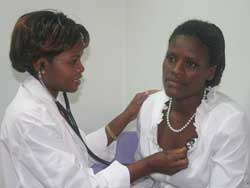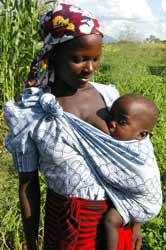Preventing HIV transmission in Malawi
March / April 2010 | Volume 9, Issue 2
Dr. Agnes Moses
Physician-Scientist, HIV/AIDS Transmission, University of North Carolina Project, Malawi
Dr. Agnes Moses describes herself as an unlikely physician. “My father, who died when I was 11, was semiliterate and my mother is illiterate. Against all odds, three out of the four girls in my family managed to get a university degree. This was not easy in our community. No girl ever completed grade 10! I am passionate about helping and encouraging less privileged children, especially girls, because I have come to understand that it takes the grace of God, discipline and good-willed individuals to realize one's dream.”
Fogarty helped her realize her dreams through its AIDS International Training and Research Program (AITRP) that funded her four-year medical residency at the University of Witwatersrand in Johannesburg, South Africa. Her residency took her from being a general practitioner to an internist with specialties in HIV and cancer.

Photo courtesy of Dr. Moses
Fogarty funded Dr. Agnes Moses’ four-year medical
residency at the University of Witwatersrand in
Johannesburg, South Africa.
Previously, Moses worked for the University of North Carolina’s Project-Malawi, supported by Fogarty. She spearheaded a program to reduce mother-to-child transmission of HIV. Her mentor, Dr. Charles van der Horst of UNC, recalls his first hire.“She had everything up and running at a breakneck pace and it quickly became the model for how these programs should be operated.”
Representative of Moses’ work is an uneducated 32-year-old mother who came to the clinic, was HIV-positive and eligible for antiretroviral therapy, but decided to seek traditional therapy. “That usually includes finding out who bewitched whom, or exorcism of evil spirits. It broke my heart,” says Moses.
Out of a population of only 12 million in Malawi, almost 1 million people are living with HIV/AIDS, including more than 90,000 children. Annually, an estimated 30,000 newborns are infected with HIV by their mothers.

Photo by Virginia Lamprecht,
courtesy of Photoshare
Dr. Moses leads a program to
prevent mother-to-child
transmission of HIV. In Malawi,
30,000 newborns are infected
each year by their mothers.
When Moses began working on this aspect of HIV transmission in 2001, only half the pregnant women in her region were being tested for HIV; a quarter of those were infected. Six weeks after birth, the disease had been transmitted to 26 percent of their babies. Thanks to testing and effective, inexpensive treatment, the rate of HIV infection at six weeks has been reduced by about half. The program reaches 60,000 pregnant women per year.
Moses authored a journal article for AIDS, reporting on her testing and prevention program for pregnant women. When same-day HIV testing was offered, it increased acceptance by almost a third. When women had to choose to opt-out of testing, only 1 percent did.
In recognition of her work, the Elizabeth Glaser Pediatric AIDS Foundation honored Moses with its prestigious International Leadership Award. Recipients are expected to mentor and train other promising clinicians, researchers and health care workers in their countries.
Moses juggles four roles between specialties in HIV and cancer. She is a senior clinical researcher on a clinical trial, does patient care and consulting at a clinic, is co-leading cancer physician at the local hospital and she leads the HIV transmission program. Committed to her homeland, she says, “My measure of success is contributing to the welfare of the community, reducing HIV and cancer in Malawi.”
More Information
Prevention of mother-to-child transmission: program changes and the effect on uptake of the HIVNET 012 regimen in Malawi. Moses A, Zimba C, Kamanga E, Nkhoma J, Maida A, Martinson F, Mofolo I, Joaki G, Muita J, Spensley A, Hoffman I, van der Horst CM; UNC Project Call to Action Program. AIDS 2008 Jan 2;22(1):83-7.
To view Adobe PDF files,
download current, free accessible plug-ins from Adobe's website.